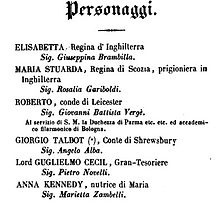Giuseppina Brambilla
Giuseppina Brambilla | |
|---|---|
 Cast of Donizetti's Maria Stuarda with Brambilla as Elisabetta, performed at the Teatro Grande, Barcelona in 1843 | |
| Born | 9 May 1819 Cassano d'Adda, Italy |
| Died | April 1903 Milan, Italy |
| Known for | Opera singer |
Giuseppina (or Giuseppa) Brambilla[a] (9 May 1819 – April 1903) was an Italian opera singer who, like her sisters Marietta and Teresa Brambilla, sang leading roles in the major opera houses in Italy, Spain, France and England. Although often described in modern reference works as a contralto, she also sang many soprano roles including Marie in La fille du régiment and Abigaille in Nabucco. She married the tenor Corrado Miraglia in 1857 and retired from the stage in 1862. Her niece, Teresina Brambilla, was also an opera singer.
Life and career
Brambilla was born in
The family moved to Milan in 1828, and Giuseppina had hoped to train at the
She appeared in Rome's
On her return to Italy she sang in several provincial theatres before accepting a contract as the prima donna with the Italian opera company at the
Notes
- ^ Her first name has been rendered in various 19th-century French sources as Peppina or Pepina. She is also sometimes confused with another 19th-century contralto, Gaetanina Brambilla, who was not related to her.
- ^ Lauretta (or Laura) Brambilla had the shortest career of the five sisters. She attended the Milan Conservatory but was very unhappy there and eventually left before finishing her course. She appeared on stage in Milan and Venice in 1844–45, but then retired to marry and raise a family. She died of cancer at the age of 56.[1]
References
- ^ ISBN 9788897794097. Extractsretrieved 28 January 2015 (in Italian).
- ^ Mattera, Angelo (1971). Brambilla, Marietta". Dizionario Biografico degli Italiani, Vol. 13. Treccani. Online version retrieved 27 January 2015 (in Italian).
- ^ a b Forbes, Elizabeth. (2008). "Brambilla, Giuseppina" in Laura Williams Macy (ed.), The Grove Book of Opera Singers, p. 58. Oxford University Press
- ^ Le Ménestrel (1 November 1846). "Théâtre Italien', p. 2
- ^ Makolkin, Anna (2004). A History of Odessa, the Last Italian Black Sea Colony, p. 195. Edward Mellen Press.
